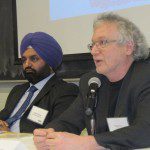For Punjabi journalist Jagdish Grewal, reporting can be a matter of life or death
Jagdish Grewal (left) and Paul Knox at the 2012 Press Freedom in Canada conference at Ryerson University.
It seemed like any other workday. Jagdish Grewal, editor and publisher of Canadian Punjabi Post, was in his newsroom in Brampton working late after attending a meeting. Around midnight, he walked out into the parking lot and slid into the driver’s seat of his van. As soon as Grewal closed the door he noticed three masked men dressed in black running toward his car. He locked the doors and tried to drive away, but the men were not deterred. One smashed the window with a steel rod and dragged Grewal out of his seat, though not before he managed to briefly honk the horn. Another pointed a gun to Grewal’s head while the rest beat him viciously. “The moment they put the gun on my head, I said goodbye to this world. In my mind I said goodbye to my family. And said this is it. Any moment there is going to be a bang and I’m done,” says Grewal, recalling the 2009 assault. Honking the horn of his van saved Grewal’s life. An employee who heard the commotion opened the door of the newsroom to see the attackers, and quickly called the police. The men fled. Grewal’s attack was not the first against a member of the Punjabi media to occur in Canada. In fact, three Punjabi journalists have been murdered in the last 25 years. The first murder occurred in 1991, when Prithvi (Lali) Vij was fatally shot getting into his car outside the Multicultural Media Inc. studio in Toronto where he produced the Sounds of Asia TV show. One year later, businessman and TV producer Dhian Thapar was murdered while parking his car in his driveway in Whitby, Ontario. Then in 1998, Tara Singh Hayer was killed in British Columbia after speaking out against violent Sikh separatists. All three cases remain unsolved. Like the other three, Grewal is a prominent member of the ethnic press and essentially a gatekeeper of information for his community, which gives him notable political influence. The Punjabi community in Canada is one of the most active in terms of participating in elections and getting members voted into office, says Joe Friesen, demographics reporter at The Globe and Mail. The Conservative government has taken notice of the role Grewal plays in his community—in November 2012, when Prime Minister Stephen Harper travelled to India, Grewal was one of the few members of the press chosen to accompany him. But some in Grewal’s community feel he uses his political ties and media outlets to tell one-sided stories, especially when it comes to Indian politics and Sikh separatism, a contentious issue in the Punjabi community for decades. Separatists are responsible for the Khalistan movement—the idea of creating a separate Sikh state in India’s Punjab region. The movement continued to grow in the 1970s and 1980s. It culminated in 1984 when armed separatists occupied the Golden Temple, one of the holiest Sikh sites, in Amritsar. The Indian army stormed the temple, killing hundreds of insurgents and worshippers. Over four months later, Indian Prime Minister Indira Gandhi was assassinated by her Sikh bodyguards, which led to violent anti-Sikh rioting. The movement for a separate Sikh state in India lost most of its active support by the 1990s when Sikhs became increasingly weary of the violence. Yet, in the Punjabi community in Canada there remains a divide between those who support Sikh separatism in their home country and those who believe it is an issue that should be left behind. Grewal believes that, as an immigrant, integrating into Canadian society is essential, so he chooses to avoid publishing coverage on separatism and extremism. This decision has angered members of his community and potentially put his life in danger. Jaspal Dhaliwal is a truck driver who, in his spare time, runs US (United Sikhs) Media Canada, a website that claims to monitor and critically evaluate Punjabi journalism in North America. Dhaliwal believes Grewal’s political coverage is inaccurate because he does not acknowledge Sikh separatists in his publications or give them time on his radio show. He claims that Grewal ridiculed him after Dhaliwal called his radio show because he did not share Grewal’s political views. “[Grewal] publicly insulted me and my family just because I was airing opinions that are in my opinion pro-human rights but some people viewed them as anti-Indian.” Grewal refutes these claims. He says Dhaliwal is part of a small segment of the population that has brought their problems from home to Canada. “They [US Media Canada] say they are working for human rights, and we cover human rights stories,” says Grewal. “But politically they are biased. They are totally anti-media and anti other countries. They want us to carry their stories and messages and they want time on our radio program and sometimes we can’t welcome that element on our programs.” Grewal also alleges that the US Media Canada Facebook page was a platform for users to post messages of hate and threats against his life. “There were threats, there were comments like, ‘Let’s put a revolver to his head,’ ‘Let’s get rid of him,’” he says. “Those people have done some large campaigns on Facebook and YouTube but they have never put up my editorial or stories and said it was wrong.” Grewal’s path into journalism was not a direct one. He immigrated to Canada in July 1987, landing first in British Columbia, where he worked on a farm picking berries. He eventually settled in Brampton, working temporary jobs and serving in the army reserves along the way. There, he became actively involved in his new Canadian-Punjabi community, founding a community club and organizing charity work. These initiatives made him a well-known figure in Brampton’s Punjabi community. In 1999, when Grewal led a campaign on Punjabi radio stations that raised over $500,000 for Toronto’s Hospital for Sick Children, people outside the Canadian-Punjabi community began to take notice. It was this support that gave him the confidence to go into the media business three years later. “Before I started the Punjabi Post, I was making good money [at Chrysler] but I quit. I refinanced my house and whatever I saved for my kids I put into this,” he says. “My family was telling me that this was very difficult and that it’s not worth it. I asked them: ‘How many technicians are in Canada? How many truck drivers? How many garage owners? But out of India, how many are running a daily newspaper? Only me.’” Today, the Punjabi Post is a self-sustaining paper with an estimated readership of 35,000. The content is a mix of Canadian politics, local community coverage, and editorials by Grewal. In addition, Grewal hosts a radio show on weekdays and publishes the weekly English newspaper South Asian Vision. “The fact that a small community in Brampton can support a daily media, it shows the influence this publication plays on the community. It shows that this community depends totally on their own media,” says Thomas Saras, president of the National Ethnic Press and Media Council of Canada. “[Grewal] has real power because the community follows him and if the community follows you have the power.” Yet in spite of the danger and the ideological split in Grewal’s community, he continues to publish the Punjabi Post. In fact, the day after Grewal was attacked over three years ago, he went to work. Just like he will tomorrow, and the next day. “I am very proud to have started [the Punjabi Post] and to have made my mark,” he says. “It has become a very good platform and it’s my privilege to do what I do by bringing change. I managed to build a bridge between the mainstream and my community.” Photo by Syeda Fatima.














